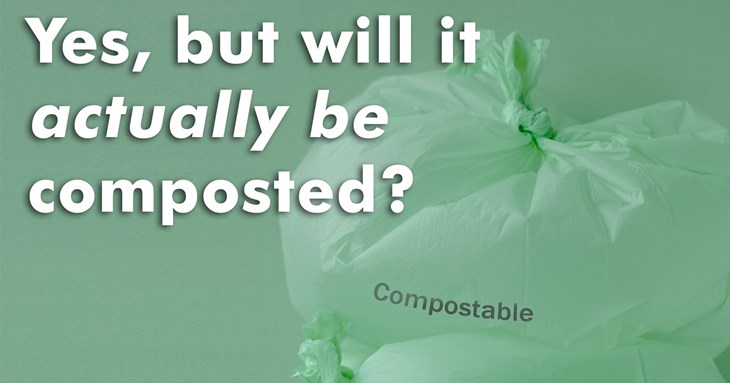Everyone knows that compostable plastic packaging can’t be recycled, right?
Published: 22 June 2023

In his regular feature, Denis the Dustcart talks about compostable plastic packaging.
OK, pretty-much everyone knows that compostable plastic packaging can’t be recycled, right?
That’s why it’s promoted as ‘compostable’ rather than ‘recyclable’.
Right?
But can they actually be composted?
Or, should I say, WILL they actually be composted?
If a packet says it is ‘fully home-compostable’, you can probably count on it breaking down in a home garden composter. In order to make sure this happens, you will, of course, need access to a home garden composter – either your own or a neighbour’s or a friend’s, etc..
I wonder how many people in Exeter actually have a compost heap.
If a packet is billed simply as ‘compostable’ or ‘compostable via industrial methods’ or something like that, it is very unlikely to break down in a home composter. It will need to go to an industrial facility instead.
Many manufacturers claim their compostable packaging can be put in your food waste bin. This is only the case, however, where your local council sends food waste to an industrial composting facility.
No council in Devon uses industrial composting for food waste. We all use anaerobic digestion, which generates electricity, biogas and soil improver. This system is widely used across the country, though not in every area.
Compostable packaging requires oxygen to break down. Anaerobic literally means ‘without oxygen’, so you can’t use your food bin for compostable packaging in Devon because that packaging won’t break down with the food.
All those compostable caddy liners? They’ll be removed by the anaerobic digestion plant, along with any other plastic liner. You’re better off saving yourself money by reusing old salad bags and the like to contain your food; moreover, this will give those bags an extra useful life. (The plant will thank you for not using compostable bags, too, since they are so stretchy and difficult to remove.)
The same goes for all compostable packaging – from pouches to tubs to lids to coffee pods to coffee cups.
How many compostable cups actually end up being composted? More than likely they will end up in a litter bin. Importantly, because they contain bioplastic, they can’t be recycled with ‘standard’ disposable cups via coffee-shop recycling schemes.
To be clear: this isn’t a problem with food and packaging recycling schemes. Anaerobic digestion has many advantages, as listed above.
The problem is caused by the sheer availability of single-use products, which are designed to maximise profit.
Producers face a problem: rising awareness of the harm caused by single-use products threatens the level of profits that can be generated from the sale of those products. The solution? Encourage guilt-free consumerism.
But just because the guilt isn’t felt, that doesn’t mean no harm is being done.
If you have a guaranteed and accessible route to composting home-compostable plastics, by all means use them. Otherwise, just be mindful of what you’re bringing into your ownership.
When it comes to disposable goods, what’s better: something designed to become a tiny amount of soil-improver after just one use having taken a lot of energy to produce in the first place, or something made from recycled plastic that’s designed to be recycled over and over again?
Sure, plastic pollution is a major problem, but many items of compostable plastic won’t easily disperse in the sea. Some are better than others, but many require very specific conditions in order to break down.
The fact is, composting is lower down than recycling on the Waste Hierarchy. Recycling what we buy is lower than reusing it. Reusing stuff is below reducing waste by not buying so much stuff in the first place.
Let’s not be so easily distracted from the effort to fundamentally cut down on the waste we produce, whatever that waste is made from.
People can follow Denis the Dustcart on his Facebook page.

